How to Choose the Best Roofing Contractor
After performing thousands of home inspections, it’s safe to say that I’ve seen my fair share of bad roof installations. To most of us, the roof on your home is the most expensive item you’ll ever have to buy. And I get it, it’s tough to fight the urge to call a few roofing contractors, get estimates from whoever will answer the phone and hire the one who gives the lowest price. The truth is that roof installations are just like everything else – you get what you pay for.
My world revolves around houses and contractors. I spend every day of my life looking at problems and trying to explain them to everyday people like you, who may not know much about houses. I see the good, the bad, and the ugly when it comes to houses, so I can help you when the time comes to have your new roof installed. We’ll look at different shingle options, the underlying details, and warranty you may (or may not) get on your new roof.
There are many different types of roofs you can get for a house. Wood shake, tile, slate, metal, and rubber are just a few of the options besides asphalt shingles. This article will assume you are having asphalt shingles installed as your new roof covering. Most of the homes in my part of the country have this type of roof covering, as do nearly 70% of all homes in the U.S.
GET 3 QUOTES FROM ROOFING CONTRACTORS AND CHOOSE THE ONE IN THE MIDDLE.
This is horrible advice, by the way. Folks love to tell you anytime you have work done around your home that you should get 3 ‘bids’ and choose the guy whose price lands in the middle of the pack. I’ve never ascribed to this idea, as there are way too many variables involved:
- How skilled is the contractor?
- How smart is the contractor?
- How well does the company communicate with you about what is happening?
- Do they answer the phone when you call?
- Do they return your call in a timely manner?
- How long have they been in business?
- Do they have reputable referrals?
- Do they have insurance?
I could go on forever, but you get the idea. There are a lot of moving parts when dealing with hiring people to work on your home, and I implore you to not get caught up in the price trap. Just because someone calls himself a professional doesn’t make it so. I would argue that you are more likely to find that the opposite is true. There are very few actual professionals out there.
When it comes to your roof, you only see the top layer of the job, and all the critical details that make or break a roof install are covered up by this top layer. Even the crappiest roof install can look good on the surface, so it is very important that you hire a roofing contractor who will make sure the details are perfectly executed before the shingles are installed. You get no second chances when it comes to a roof. Either it’s done correctly, or you tear it off and start over.
Oh, and there is no such thing as a ‘licensed roofer in Kentucky,’ or in many other states. I found this list after about 30 seconds of research, so take it with a grain of salt: List of State Laws Regarding Roofers. Be cautious if your guy claims to be ‘licensed.’ Even if you live in a licensed state I would put no faith in a roofer’s claim. After all, everyone you see driving on the road should have a license…and we all know that everyone is horrible at driving. Well, except you of course.
Any roofing contractor that should get even the slightest bit of your consideration will put together a ‘bid’ or proposal of what the work scope will be. What does this proposal look like? Is it broken down into what gets done, and more importantly, what doesn’t? Is it detailed in what the company is telling you? Is it written on a cocktail napkin? (I’m not joking.) In most circumstances, this proposal is your scope of work with this roofing contractor. It spells out what they will do for you, what they won’t, and what you will pay them for the job.
SPEAK THE LINGO. DON’T LET SOME FAST TALKING CON-MAN CONFUSE YOU.
Understanding the terminology will help you navigate through the process while talking to your potential roofer. Let’s look at the most widely used terms in the roofing world, and get a quick explanation of what they are so that if you see them in your roof proposal, you’ll have an idea of what they’re talking about.
What is a ‘Square of Roofing?
Your roof is priced and sold to you using a term called ‘a square’. A square is a 100 square foot area of your roof slope (a 10×10 section) This term usually applies to the pricing of underlayment, ice and water shield, shingles, and just about every other thing you’ll see on your roofer’s bid. The next time you are spending date night in Lowe’s, stroll down the shingle aisle and look at the price tag of shingles. The price they advertise is for one bundle, but for most styles of shingles, it takes 3 bundles to make ‘a square’. If your roof calls for 30 squares, you need 90 bundles of shingles to get the job done.
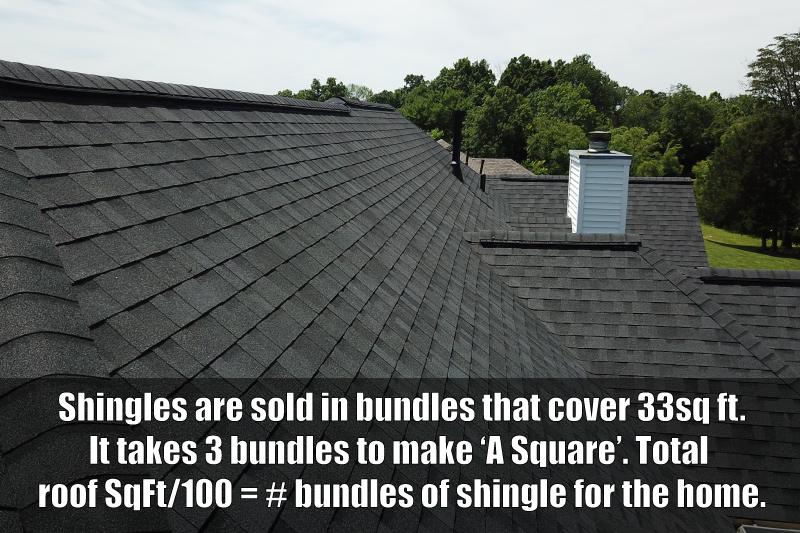
What is a Flashing?
Flashings are pieces of metal (usually) that are installed at the weak (or leak) points of a roof installation to prevent water intrusion. A quality roof will have them installed all around the edge of the roofline, where vertical walls meet the roof slope, around pipes that stick up through the roof, and around all sides of the chimney.
Improperly installed flashing, or flashing that is missing altogether, is where the vast majority of roof leaks stem from. Most roofs don’t leak in the middle of a roof slope, they leak from failed or improperly installed flashings.
One of the most critical pieces of flashing that is typically always missing is called a kickout flashing. Missing kickout flashings usually cause hidden water damage in walls below a gutter-to-wall intersection.
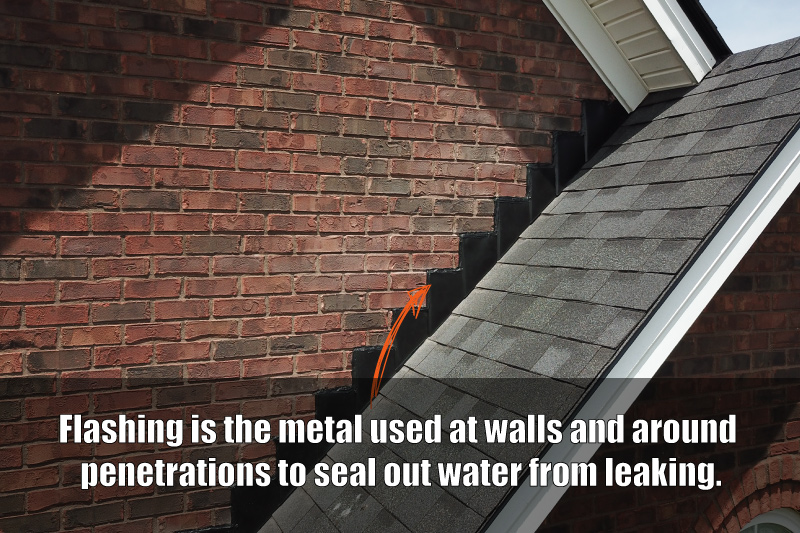
What is a Ventilation?
Attic ventilation is part of the roofing system where cooler air is brought in through the lower intake vents, and hot attic air is exhausted out of the upper vents. Both sides of this equation are important, and ideally, you want as close to even in/out as you can get. Too much exhaust ventilation and not enough intake ventilation can create a negative pressure environment that will draw air from your living space (this is the last thing you want). In a perfect world, your attic should not ‘communicate’ or be connected to the living space below in any way. I wrote about this in my DIY Attic Insulation Guide that you’ll want to read if you haven’t already.
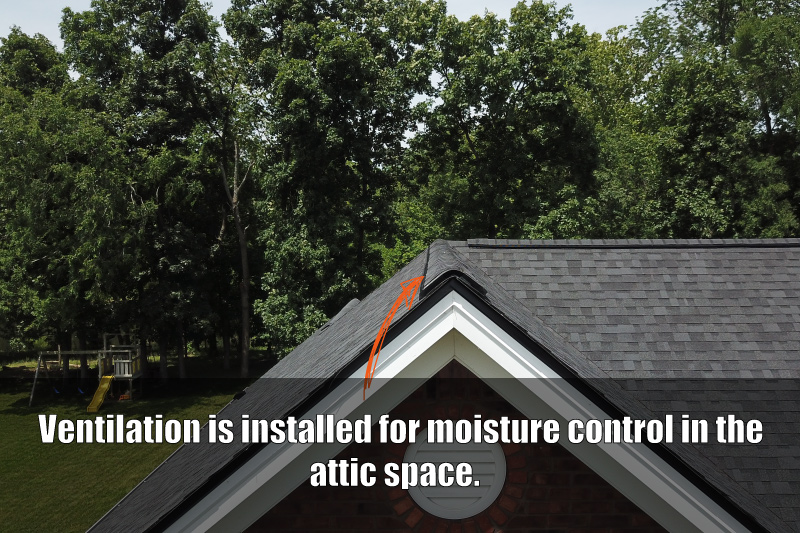
THINGS TO WATCH FOR WHEN CHOOSING A ROOFING CONTRACTOR
It’s uncommon for roofers to give you a bottom-line price without actually breaking things down in the estimate. If possible, you should also request a line item estimate on things.
TEAR OFF THE OLD ROOF -VS- OVERLAY
This step is the fastest way to weed out the bad roofing contractors. Any ‘roofer’ who says that you should just install a new layer of shingles over the old layer should be crossed off your list immediately. Having two layers of shingles is ‘allowed’ by building codes, but sticking to building codes as a benchmark builds you a D- house. It’s the minimum standard by which the home remains legal.
Multiple layers of shingles increase your chance of a blow-off and don’t allow you to replace the old flashings (which is most likely where things will fail and leak). It is a way to cut costs and keep the bottom line number lower in order to make you think you are getting a good deal. You’re not. You’re getting a crappy job at a lower cost. There are no deals when it comes to roofing or any other contractor’s work. You get what you pay for.
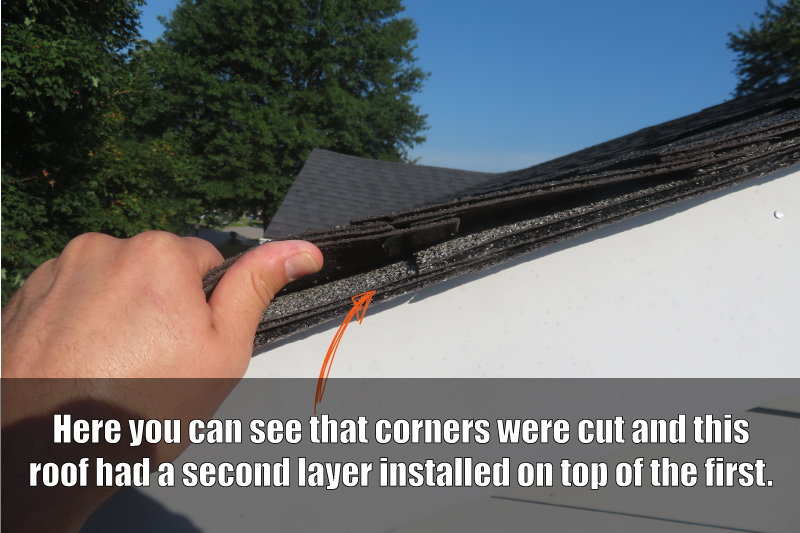
3 TAB -VS- LAMINATED SHINGLES
There are multiple choices when it comes to the style and quality of shingles you can choose from. However, the vast majority of people get either cheap 3-tab (2o year shingles) or medium grade laminated (50 year shingles) commonly known as Architectural shingles. A quick note about Architectural shingles. A few years ago, most of the manufacturers changed their 30 year shingle to a 50 year shingle. Did they change anything about the shingles you may ask? Not that I can tell. But it sure does sound better that you have a “50 year shingle” on your roof. The year rating is what the manufacturer tells you the shingles should last if installed correctly. They hardly ever last that long. Most folks get about 75% of that time in real-world settings. A well installed Architectural shingle should last 25-30 yrs, give or take a year or two.
If a roofing contractor tries to sell you 3-tab shingles, they are not the person you want working on your house. The cost difference is minimal, and the quality difference is huge. It just doesn’t make sense to buy 3-tab. I asked Bone Dry Roofing about 3 tab options and my salesman chuckled and said ‘No, we don’t like to install 3-tab shingles on a house. We’ll do it if requested, but by default, we like to see everyone get a roof that will last, and we don’t have to worry about cheap shingles failing.”
There are several tiers above the 3-tab and mid-grade laminated shingles that you can choose from, but the cost really goes up when you get beyond the mid-grade. If you can afford it, by all means, get the best product you can. But for the sake of the masses, I’ll stick with the two most common I see.
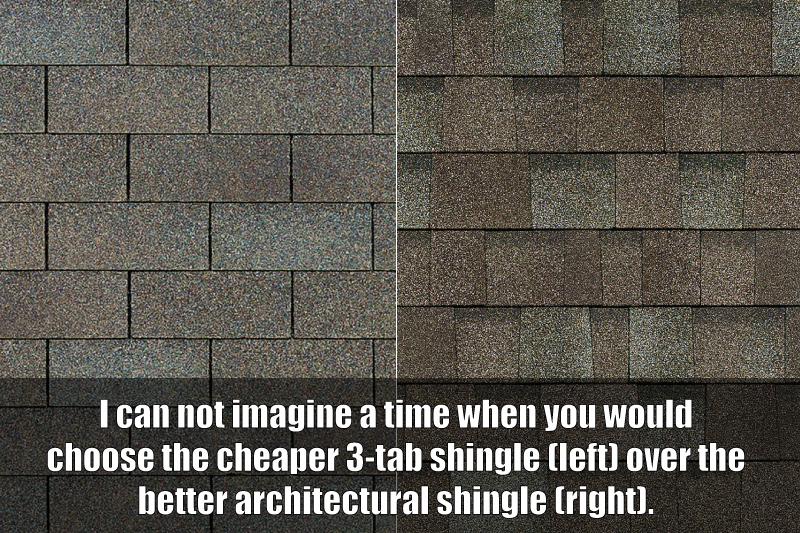
HIDDEN DETAILS – THE PREP WORK
It’s not enough to get a good quality shingle. The details and prep work that happen before the first shingle is laid are also critical to getting a high-quality roof installed. Look for details like new flashings that are properly installed, new underlayment, new drip edge flashing, new ice & water shield, etc.
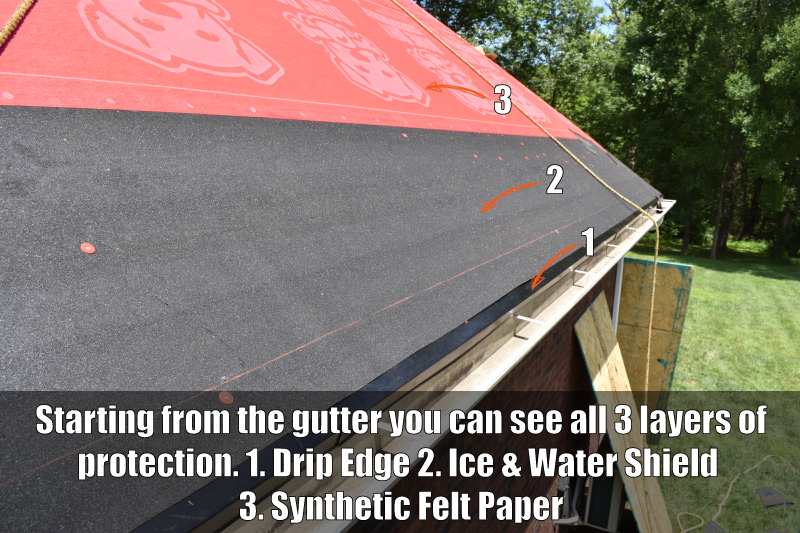
- WARRANTY – Your new roof may or may not have a real warranty. Most shingle manufacturers do offer product defect warranties, but most roof issues are caused by flashing defects or installation errors of the shingles. In other words, things that are not the fault of the shingle manufacturer. If your new roof, which you just paid thousands of dollars for, was installed by some conman wannabe roofer who doesn’t stand behind his work, you could be in big trouble. Many people have felt the sting of having to pay for a roof twice to get it done properly the second time around. A roof installed by a quality contractor will very likely have a parts and labor warranty. Just be sure you get all that writing for your records.
- INSURANCE – This one seems like a no-brainer to me, but you always want to check and make sure the contractor you are vetting has the proper insurance for himself and anyone who is working for him. If you ask to see proof and he does anything other than say “no problem, here you go,” strap on those sneakers and RUN AWAY. If your roofer (or any other contractor for that matter) acts like he doesn’t want to show these types of documents, that is your cue to send him on his way.
If I have performed a home inspection for you in the past 5 years and you needed roof work or masonry repairs on your new home, chances are I told you to call Bone Dry Roofing. They have been taking care of my customers for years, and I’ve never heard a single negative word from anyone about their experience with them. Admittedly, this made my choice fairly easy when it came time for my own new roof, but I did call a few other roofing contractors to be on the safe side. You can read the review of my experience here Bone Dry Roofing Louisville.
Here is what I noticed: All of the other roofing contractors focused on the total cost of the job, and not the job itself.
In other words, they didn’t offer to show their value to me but instead tried to focus my attention on how big of a check I was writing. I freely grant you that I price shop things all the time. I check Amazon, eBay, and many other websites when buying some trinket or tangible item.
However, when you are hiring a skilled trade like a roofer, electrician, or even home inspector, I implore you to stand back and look at the whole scope of what you are getting.
There is no such thing as ‘a deal.’ The deal is that you are getting hosed by someone cutting corners for a cheaper price.
The ‘expensive contractors’ are not priced higher just because they want to be. Chances are they doing the job the way it should be done, and there is a cost associated with that. So, you as the customer, have to pay a bit more for it. Most folks only buy one roof in a lifetime, maybe two if they are unlucky. Make sure you do your homework, and more importantly, caveat emptor. Buyer beware.


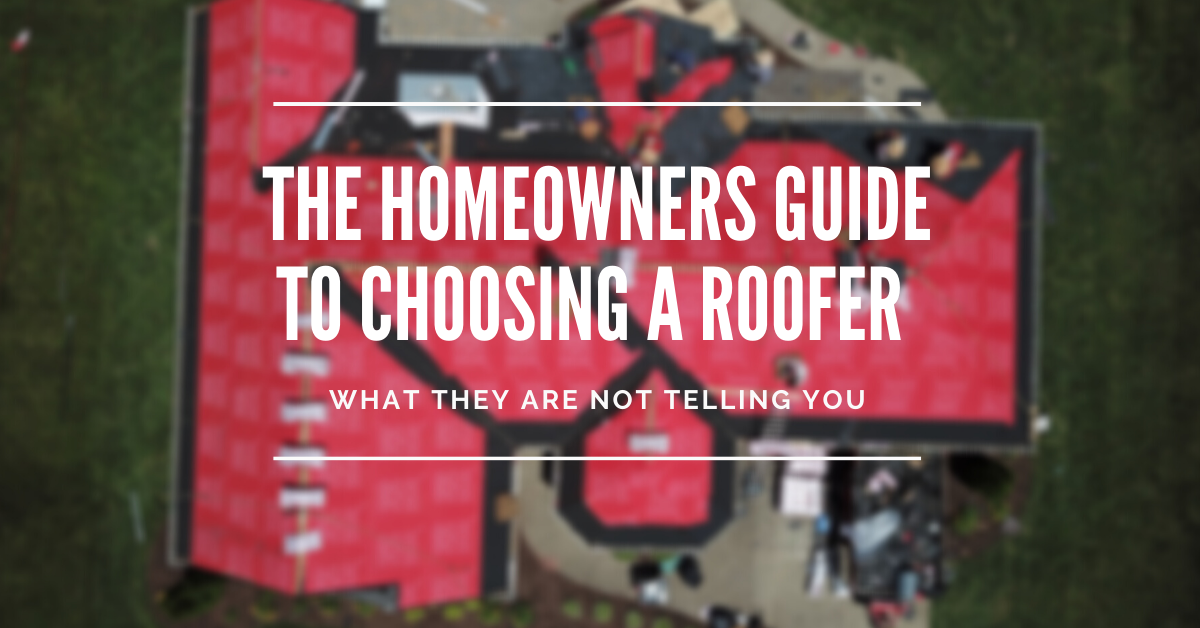
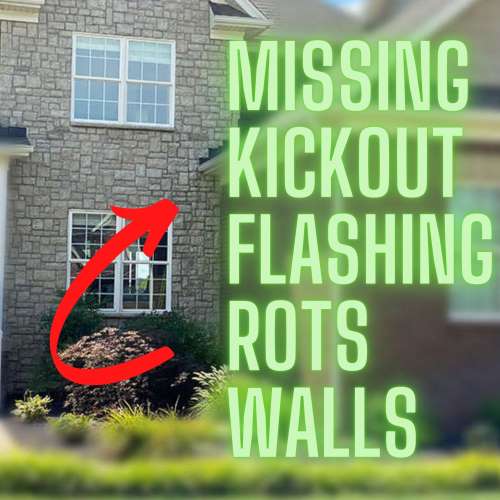
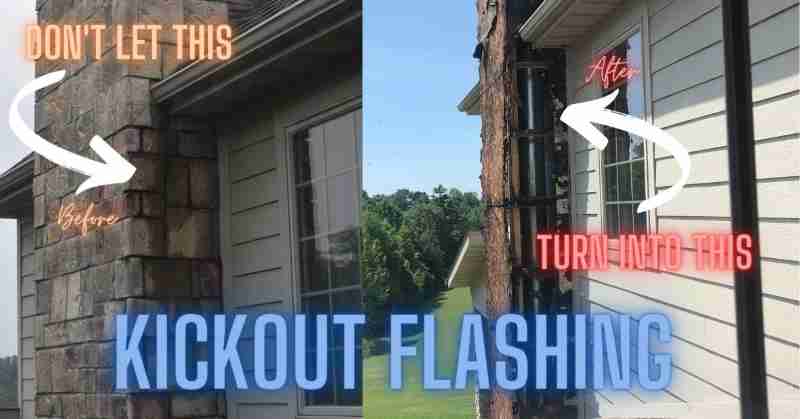
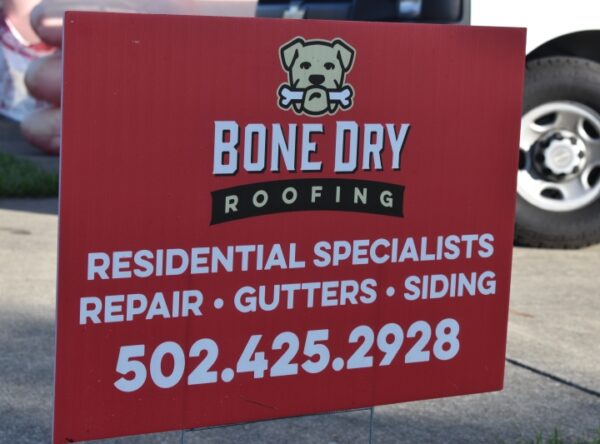
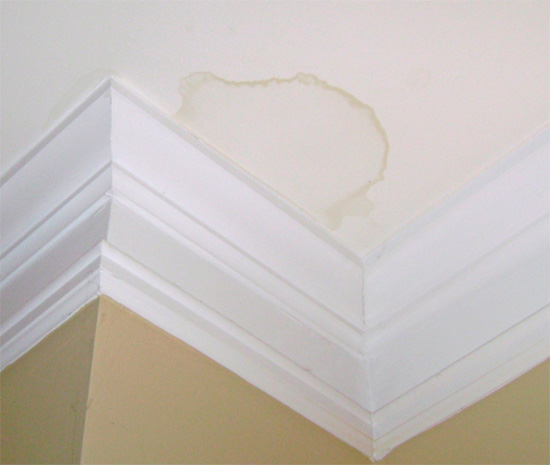

What I liked about this is that you did not just mention the right things, but also the wrongdoings that one can spot on a contractor that will eliminate him from the customer’s choices. It’s great to know both sides to specifically pick the really good ones. And since this is such a critical process, content like this is much appreciated.
Thanks, Mary. I find most folks are trusting about these kinds of things and just don’t have the guidance.
I appreciate that you mentioned that we should choose a contractor who will offer warranties on their products and their work. My wife and I have been talking about finding someone to replace our roofing material. Our current roof is very mossy and old. Some of the shingles are even loose. When we get it replaced, I will be sure to look for a roofing contractor who will offer warranties on their work.
Thanks, Charles. Yes, it is vital that whatever contractor you choose will stand behind their work.
You made a great point about ventilation and how they can help you increase cooler air into the attic. My husband and I are looking for a roofer that can help us fix the roof in our old home so that we can sell it this month. We will keep these tips in mind as we search for a professional that can help us best.
Thanks, Vivian.
It was helpful when you explained that the roofing term of “a square” refers to an area of 100 square feet. My brother is looking for a contractor to install metal roofing for the modern-style office building he’s having contracted near the highway in our city. I’ll pass along your tips so he can be as confident and informed as possible when working with a roofing provider!
I think that it is going to be helpful for us to know that we could find a roofing contractor who has a good work quality, so I appreciate the tip that you gave to check their referrals. My roof needs to have some work done because it is leaking, and some of the shingles have blown off. To help me choose the right roofer, I am going to check their referrals for reputability.
Good luck with everything. Do your homework and you’ll be fine!
I had no idea that finding a qualified roofing contractor takes much more work than just choosing the one whose price range is in the middle. It makes a lot of sense that you need to consider how long they have been in the industry and if they offer insurance. I noticed a small hole in my roof after some water was leaking during a rainstorm last night, and I want to get it fixed before any pests start coming in! I will keep your advice in mind as I look for a contractor.
You are absolutely right about the importance of warranties when choosing a roofing contractor. My mom needs to have her roof replaced. I will remind her to look into the warranties offered before she makes her purchase.
I had no idea so much went into a roof. Excellent write up!
I like how you mentioned that knowing roofing terminology will help with finding a potential roofer. My brother is thinking for a roofer because he noticed last week that some of the shingles on his roof were falling off since the materials are old worn down. It seems like a good idea for my brother to think about hiring reputable professionals to help change the materials on his roof so that his home can be properly protected from inclement weather.
Here is all on how to choose the best roofing contractor are discussed over here. So, anyone searching for same topic may find their shelter over here. This is a great article and you are banged on with your points about it.
I’m planning to hire a roofing service that will be able to replace my worn out shingles with metal ones. I agree with you that it would be best to check the customer testimonials and online ratings regarding the prospective company. You’re also right about the importance of hiring someone skilled and is insured.
You made a great point when you said that more than how much they charge, it’s best to know how skilled the contractor is, how is his communication, etc. My husband and I are looking to hire a roofing contractor so we can get an inspection. We will follow your advice most definitely since we know we want to hire someone experienced and reliable.
As someone who did roof construction for many years, I say this is spot on. One thing I would add is to make sure on any reshingling situation that your roofing contractor has a plan and pricing in place for any damaged or rotten roof decking that may be exposed by the tear off. This is especially a concern for a roof that has been leaking or had gone for a long period of time without a complete tear off. Another suggestion is to go with at least a 30lb “felt” underlay installed with button cap nails. Some roofers try to cheap out with 15lb installed with roofing tacks and I can guarantee you it will be full of tears, holes, and falling apart before the shingles even go on, especially on any kind of steep pitch and in valleys.
Great point, Mitch! I find everyone seems to fall into the price trap, and that is usually a recipe for disaster.
Great article, and great advice.
Excellent writing! We can take away a lot of important information from this article. Keep sharing great posts.
Great tip about making sure that you get shingles that will last 25 years. My roof has 16 broken shingles. I’ll have to get a roofer to repair them.